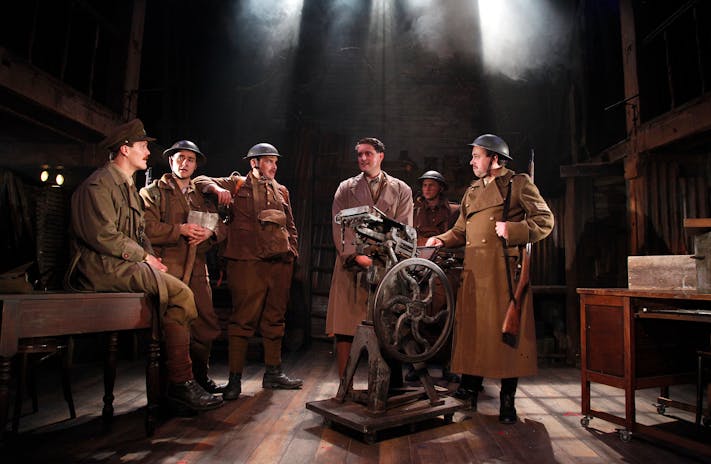You really couldn’t make it up. Ian Hislop really did unearth a newspaper which could almost have been a blueprint for Private Eye - but was in fact produced some 35 years before the Eye was born, by the 24th Division of the Sherwood Foresters in Ypres in 1916. A century later, this stage play by Hislop and his long-term collaborator Nick Newman tells the story of how The Wipers Times came into being when Captain Fred Roberts, his Lieutenant Jack Pearson and civvie street printer Sergeant Tyler discovered a manual pedal-powered printing machine lying abandoned in the bombed ruins and decided to use it for their own satirical purposes, with immediate success.
The real hero of the piece is humour. The play celebrates its enduring place in the British psyche. What gets the Brits through the trials and tribulations of the Great War is not pure po-faced patriotic stoicism but the 'grin and bear it' attitude where the insouciant grin is the better part of valour. The Brits’ irreverent spirit is repeatedly contrasted with the humourlessness of the Hun and his 'hymn of hate'.
There is a real poignancy in the story. Roberts and Pearson, the two chief drivers of the publication, achieved a level of self-actualisation and creativity (and recognition of their achievements) during the war which was lacking in their lives both before and after. It struck me that this is a story often told of women, able to realise their potential during the war years but expected to creep back into the kitchen when the men came home. The story of The Wipers Times is set in a very masculine world. The women seem rather superfluous and pretty peripheral - to be honest, I could have dispensed with all of them (apart from the post-war humourless receptionist, who was a lovely deadpan foil to Roberts’ quick-witted wisecracks).
The central theme is the part the spirit of the paper played in developing and reinforcing the camaraderie binding men together to survive adversity. So the play not only tells the story of the men, but brings the comic satirical newspaper to life, like a character in its own right, telling the story of the Great War from its own highly entertaining perspective, enlivened with music and song (all performed with energy and aplomb throughout).
The set is superb. The seemingly haphazard cluttered wooden structure works really well to provide a backdrop for seamless changes of scene from officers’ mess to muddy trench, or from seedy bordello to far-off Blighty. It is so cleverly designed: for instance, the coils of barbed wire work on so many levels, transforming, when illuminated, into the bright lights of a music hall or the outline of a cartoon speech bubble in which many of the paper’s jokes are animated.
The writing is timeless. It coherently weaves together century-old text, poetry and prose, song lyrics and jokes from the original newspaper with punchy dialogue as epigrammatic as Oscar Wilde and as bristlingly alive with off-the-cuff throwaway humour as Hislop on Have I Got News for You.
Don’t miss this show – if you can’t be in the audience, go to the Playhouse and buy yourself a programme (a bargain, bursting with facsimile material from the original Wipers Times), or the script, or a DVD ... or all three!




